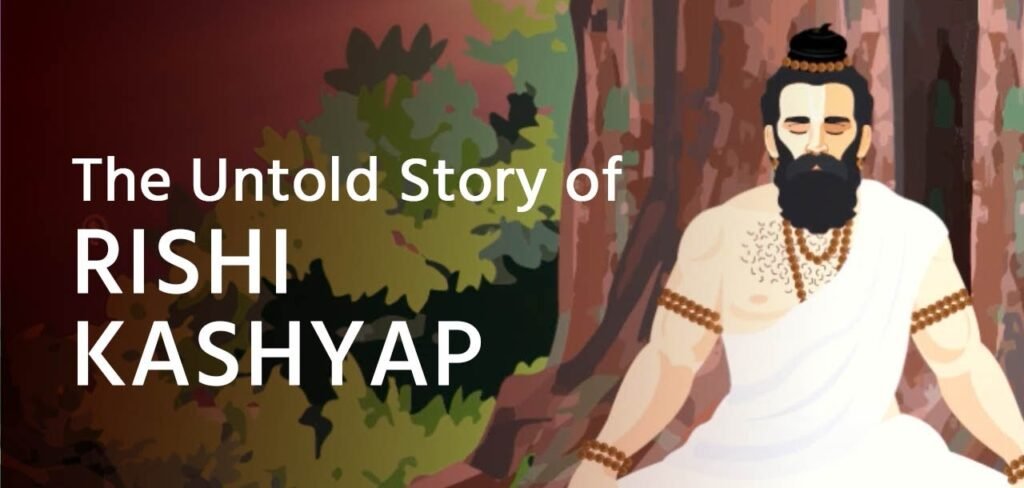Explore Gotras

Rishi Kashyap is one of the Saptarishi (Seven Great Sages) mentioned in Hindu mythology and is revered for his wisdom, contributions to the Vedic texts, and his significant role in various aspects of Hindu cosmology. He is the founder of the Kashyap Gotra, a lineage that traces its roots back to him, and his name is associated with many ancient stories in both the Vedas and Puranas.
1. Origins and Lineage
Kashyap in the Saptarishi:
Kashyap is one of the Saptarishi, the seven sages who are considered to have been created by Lord Brahma to guide humanity during different Yugas. As one of the greatest Rishis, Kashyap is honored as a teacher and spiritual guide who contributed to the preservation and propagation of Vedic wisdom.Parents:
Kashyap was the son of Marichi, one of the ten Prajapatis (mind-born sons of Brahma), and his mother is often identified as Kala or Aditi (depending on different texts).
2. Kashyap’s Contribution to Hindu Cosmology
Role in Creation:
Kashyap is often associated with the creation of various species and creatures. According to some texts, he is credited with begetting various kinds of beings (gods, demons, humans, animals, and more) with his multiple wives.Kashyap’s Wives:
Kashyap had many wives, each of whom played a significant role in the mythological stories associated with him. Some of his most important wives include:- Aditi: The mother of the Adityas (solar deities) and Lord Vishnu’s mother in his Vamana incarnation.
- Diti: The mother of the Daityas (demons), including Hiranyakashipu and Hiranyaksha.
- Kadru: The mother of the Nagás (serpent gods).
- Vinata: The mother of Aruna (the charioteer of the Sun) and Garuda (the vehicle of Lord Vishnu).
3. Kashyap in the Vedas
Vedic Contributions:
Kashyap is mentioned in the Rigveda, and he is known for his deep knowledge of sacred rituals, mantras, and spiritual teachings. He is also credited with several hymns that were part of the Vedic rituals.In the Vedic context, Kashyap Rishi was an important figure for his wisdom on cosmology and his knowledge of the forces of nature. His teachings are associated with the idea of Vedic sacrifices and mantra knowledge.
4. Kashyap’s Role in Hindu Mythology
The Story of Kashyap and His Wives:
One of the most important stories involving Kashyap is his relationship with his wives and the creation of different beings. His marriages to Aditi, Diti, Kadru, and Vinata led to the birth of several important mythological figures and deities.Kashyap and the Creation of the Adityas:
Kashyap’s union with Aditi gave birth to the Adityas, a group of twelve solar deities, including Indra, Vivasvan, Varuna, and Surya. They are essential gods in Hindu rituals, and they represent different aspects of the sun.The Story of Diti and the Daityas:
Kashyap’s wife Diti gave birth to the Daityas (demonic beings), with the most famous among them being Hiranyakashipu and Hiranyaksha, who were known for their conflict with the gods. Their story is significant because Hiranyakashipu was eventually killed by Lord Vishnu in his incarnation as Narasimha.Kashyap and the Serpents:
Kashyap’s wife Kadru gave birth to the serpent gods (Nagas), including the powerful Vasuki and Ananta. The Nagas are revered in Hinduism and have a dual symbolism: representing both destruction and regeneration.Kashyap and Garuda:
Vinata, another of Kashyap’s wives, gave birth to Garuda, the mighty bird who is Lord Vishnu’s vehicle. The story of Garuda and his enmity with the serpents (the Nagas) is famous in Hindu mythology and is a key component of the Mahabharata and Vishnu Purana.
5. Kashyap’s Significance in Hinduism
Kashyap Gotra:
The Kashyap Gotra is one of the most respected Gotras in Hindu society. Individuals belonging to this Gotra are believed to be descendants of Rishi Kashyap. This Gotra is particularly important for those who are focused on preserving the teachings and spiritual practices of Kashyap, whose wisdom and contributions have left a lasting impact on Hindu culture.Kashyap’s Teachings:
Kashyap is often regarded as a yogi and sage who contributed to Vedic philosophy, ritualistic practices, and understanding of cosmology. His influence is also evident in the principles of dharma (cosmic law) and tapas (austerity), which were central to the Vedic way of life.Spiritual Lineage:
As a patriarch of the Kashyap Gotra, his teachings on spiritual wisdom, cosmic creation, and ethical practices have been passed down through generations. The Gotra not only signifies a connection to his family lineage but also to his spiritual and intellectual legacy.
6. Kashyap in Other Texts
Mahabharata:
Kashyap is mentioned in the Mahabharata, particularly in the context of his contributions to the spiritual and ethical principles followed by the Pandavas and Kauravas.Puranas:
Kashyap plays a significant role in the Puranas, especially in stories about the creation of the world and the various gods, demons, and beings that populated it. His influence extends to the creation myths, which are an essential part of the Bhagavata Purana and other texts.
Conclusion
Rishi Kashyap is one of the most influential figures in Hindu mythology and Vedic philosophy. His contributions to cosmology, creation myths, and spiritual practices have had a profound impact on Hindu culture and continue to influence religious practices to this day. The Kashyap Gotra remains one of the most respected Gotras, representing wisdom, creation, and spiritual discipline. Kashyap’s legacy is also carried forward through the stories of his children, including Dattatreya, Durvasa, Garuda, and others who each contributed significantly to Hindu mythology.
